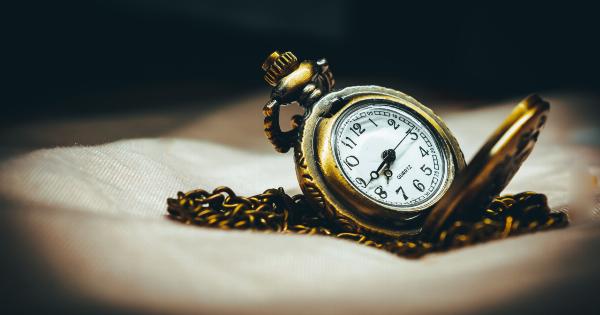Love is often seen as a magical and extraordinary feeling that captivates individuals, making their hearts flutter and their minds race.
The period of falling in love, also known as the honeymoon phase, is a time when emotions and infatuation are at their peak. It is characterized by intense attraction, excitement, and an overwhelming desire to be with the beloved.
This article delves into a study that examines the period of falling in love, shedding light on its duration, chemical processes, and psychological effects.
The Duration of Falling in Love
While the experience of falling in love is subjective and unique to each individual, research suggests that the period of intense infatuation typically lasts for around 12 to 18 months.
This duration may vary based on factors such as the level of commitment, external circumstances, and the personalities of the individuals involved. It is important to note that the intensity of feelings may gradually decrease as time goes on, but this does not necessarily mean that love has faded.
Instead, it signifies a transition from the initial honeymoon phase into a more stable and lasting form of love.
Chemical Processes and Love
When two individuals fall in love, a complex interplay of chemical processes occurs within their brains and bodies.
One of the key hormones involved in the experience of love is dopamine, often referred to as the “pleasure hormone.” Dopamine levels surge during the initial stages of falling in love, triggering feelings of euphoria and bliss. This explains why individuals in the early stages of a romantic relationship often report heightened happiness and a sense of being on cloud nine.
In addition to dopamine, the hormone oxytocin, commonly known as the “cuddle hormone” or “love hormone,” plays a crucial role in bonding and attachment.
Oxytocin is released during physical contact, such as hugging, kissing, or sexual activity, promoting feelings of trust, intimacy, and closeness. This hormone fosters emotional connection and deepens the bond between two individuals.
Furthermore, falling in love also activates the brain’s reward system, which is associated with the release of endorphins. Endorphins are natural opioids that create a sense of pleasure and reinforce positive behaviors.
This neurochemical mechanism strengthens the bond between two individuals, making them more inclined to nurture and invest in their relationship.
The Psychological Effects of Falling in Love
The period of falling in love not only has significant physiological effects but also deeply impacts an individual’s psychological well-being.
Many report feeling a renewed sense of purpose, increased self-esteem, and a greater overall sense of happiness. Love can serve as a powerful motivator, encouraging individuals to become better versions of themselves and engage in positive personal growth.
The infatuation and attention received during this phase can create a sense of euphoria, leading to a temporary absence of negative emotions and a heightened focus on the positive aspects of the relationship.
This can result in a period of intense bliss, often referred to as the “rose-tinted glasses” phase.
However, it is essential to acknowledge that the period of falling in love is not without its challenges. As the initial rush of emotions subsides, individuals may begin to notice imperfections or differences within their partner.
This transition from idealization to realism can be both eye-opening and emotionally challenging. It is during this phase that couples may encounter conflicts and disagreements as they navigate their expectations and compatibility.
Factors Affecting the Experience of Falling in Love
While falling in love is a universal human experience, the way it unfolds and the intensity can vary due to several factors. Cultural norms, upbringing, personal beliefs, and experiences shape an individual’s perspective on love and relationships.
These factors influence the expectations individuals bring into a romantic partnership, as well as their ability to navigate the challenges that arise.
Furthermore, the stage of life in which individuals find themselves can significantly impact the experience of falling in love.
Younger individuals may be more prone to intense infatuations, while those who have experienced previous relationships might approach love with caution and a more realistic view.
External circumstances, such as social support and stress levels, also play a role in the experience of falling in love.
Having a strong support system can enhance the positivity and longevity of the honeymoon phase, while high levels of stress or personal difficulties can impede the ability to fully immerse oneself in the experience.
Long-Term Effects and Sustaining Love
As the period of falling in love inevitably transitions into a more mature and stable form of love, individuals often wonder how to sustain the connection and passion that initially drew them together.
Building a lasting and fulfilling relationship requires effort, commitment, and effective communication.
Engaging in shared activities, maintaining open lines of communication, and expressing love and appreciation for one another are vital to fostering a deep and lasting bond.
It is also crucial to embrace the reality that love is not always a constant state of intense infatuation and excitement. Relationships naturally fluctuate in intensity, and finding contentment in the quieter, more stable stages is an important aspect of long-term love.
Investing time and energy into the relationship, prioritizing emotional and physical intimacy, and adapting to the changes that occur over time can help nurture love and strengthen the bond between two individuals.
Relationships that withstand the test of time are built on a foundation of trust, respect, and mutual understanding.
Conclusion
The period of falling in love is a remarkable and transformative experience, characterized by intense emotions and infatuation. It has both physiological and psychological effects, driven by the release of hormones such as dopamine and oxytocin.
While the honeymoon phase eventually subsides, love continues to evolve and flourish in its own unique way. Understanding the duration, chemical processes, and psychological effects of falling in love can provide valuable insights into the complexities of human relationships.





























